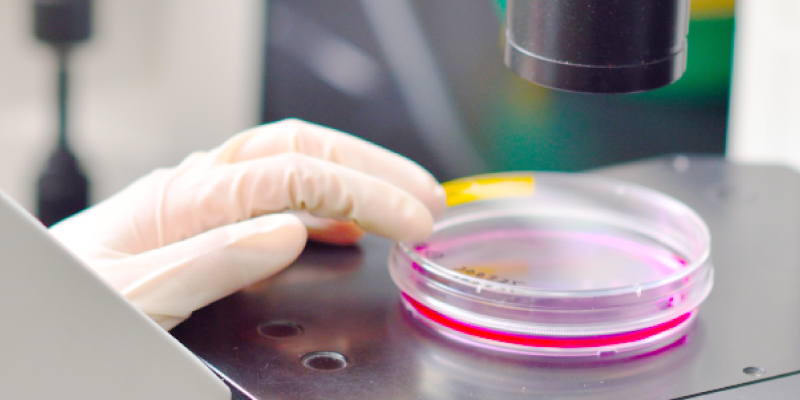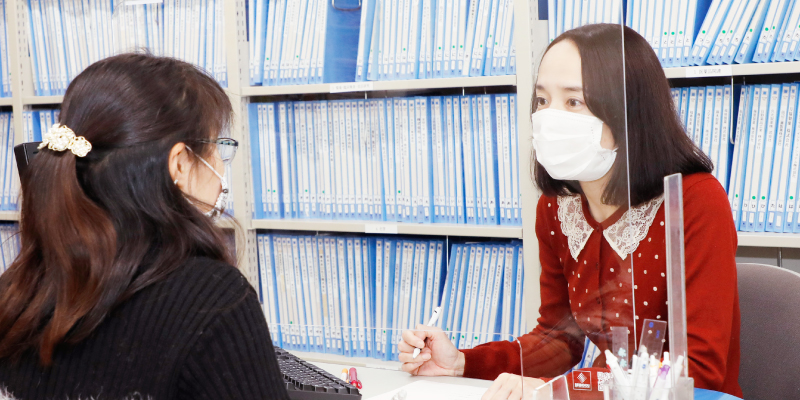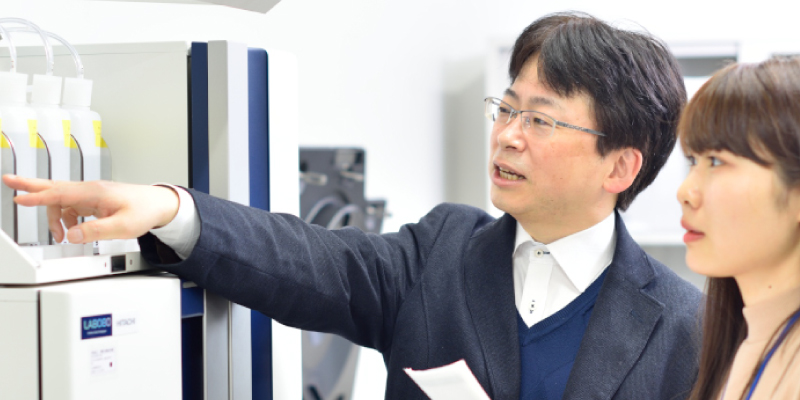フロンティアバイオサイエンス学科 臨床検査学コース
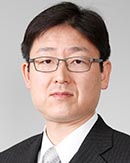 伊藤 洋志(いとう・ひろし)
伊藤 洋志(いとう・ひろし)
Hiroshi Itoh
専門分野/生体防御学、臨床検査学
研究キーワード/食細胞、好中球、自然免疫、感染症、炎症
職位:准教授
学位:博士(人間健康科学)(京都大学)
- 東京医科歯科大学大学院医学系研究科保健衛生学専攻博士前期課程修了
- 神戸大学医学部附属病院検査部臨床検査技師、京都大学医療技術短期大学部助手、京都大学大学院医学研究科人間健康科学系専攻助教を経て本学
研究テーマ
臓器移植をはじめとする高度先進医療によって原疾患の治療に成功しつつあっても、免疫抑制剤などによる免疫力の低下に起因する感染症の克服が、現代医療の課題のひとつとなっている。多剤耐性菌による感染症では抗菌薬に依存する治療法には限界があることから、生体防御を担う白血球、とりわけその一次機構に中心的な役割を担う好中球やマクロファージに関する研究が新たな治療戦略に繋がると期待される。また、炎症性疾患は最も頻度の高い疾患群のひとつであり、その病態形成にこれらの免疫細胞が深く関与している。炎症性疾患の病態として免疫細胞の機能亢進が指摘されており、免疫細胞の機能制御機構などを明らかにすることが重要と考えられる。
1. 好中球機能におけるオートファジーの役割に関する研究
重症感染症では、抗菌薬とともにしばしば静注用免疫グロブリン(IVIG)製剤が併用され、治療成績の向上が報告されている。我々は、IVIG 製剤による好中球の食殺菌能増強効果を大腸菌や緑膿菌の多剤耐性株を用いたin vitro 実験で示した。同様の効果は、造血幹細胞移植後で免疫抑制剤投与中の患者好中球においても確認された。このとき、好中球は細胞内寄生性を有しないこれらの菌に対する貪食促進によってオートファジーが誘導され(Fig.1)、菌を内包するオートファゴソーム(Fig.2)数が増大すること、オートファジー阻害剤による好中球の殺菌能低下を明らかにした。この所見は、好中球の殺菌能におけるオートファジーの役割を示している。このように、好中球の諸機能におけるオートファジーの役割について研究を行っている。
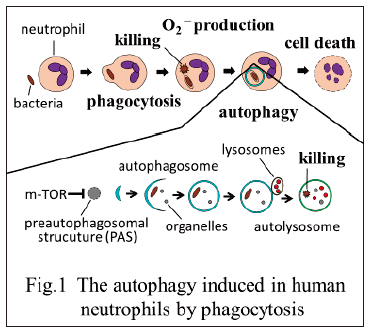
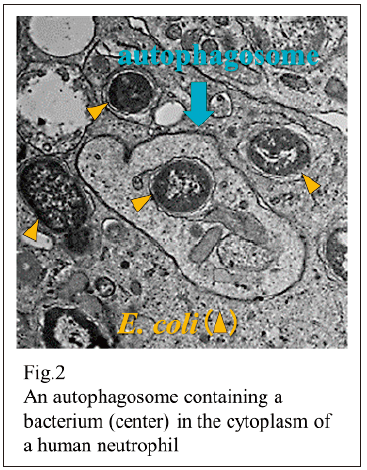
2. マクロファージ機能におけS100タンパク質の役割に関する研究
カルシウム結合タンパク質の一種である S100A8/A9は、マクロファージや好中球など主に骨髄系の免疫細胞が産生するタンパク質であり、炎症反応に深く関係する重要なメディエーターと考えられている。我々は、本タンパク質がこれら免疫細胞の機能調節に重要な役割を果たしていると考えている。最近、大腸組織中マクロファージに発現するS100タンパク質が潰瘍性大腸炎を含む炎症性腸疾患(IBD)の発症に関係している可能性が報告された。現在、S100タンパク質による免疫細胞の機能調節機構を分子レベルで解析し、IBD発症原因の解明とその治療法の開発を目指した研究に取り組んでいる。
| 研究の応用領域 | 産官学連携で求めるパートナー |
|---|---|
| 感染症・炎症性疾患の治療薬・診断薬の開発 | 医療機関、治療薬・診断薬関連企業 |
Topics of research
While highly advanced medical treatments, including organ transplantation, can be used to cure various primary diseases, infectious diseases that arise in patients that have been immunocompromised by immunosuppressive agents remain an issue in modern medicine. Antibiotic-dependent treatments have limited use for curing infectious diseases caused by multidrug-resistant bacteria. Thus, studies on leukocytes, such as neutrophils and macrophages, which play a central role in primary host defense, are expected to lead to novel treatment strategies. In addition, inflammatory diseases are one of the most common disease groups, and leukocytes are deeply involved in the pathogeneses of inflammatory diseases. As excessive activity by these immune cells is involved in the pathologies of inflammatory diseases, it is important to investigate the mechanisms that control immune cell functions.
1. Study on the role of autophagy in neutrophil functions
For severe infectious diseases, intravenous immunoglobulin (IVIG) preparations are often used alongside antimicrobial agents, and this approach has been reported to improve treatment outcomes. We showed that an IVIG preparation increased the levels of phagocytosis and killing activity exhibited by human neutrophils in in vitro experiments involving multidrug resistant strains of Escherichia coli and Pseudomonas aeruginosa. The same effects were also confirmed in human neutrophils isolated from patients who were receiving immunosuppressive agents after hematopoietic stem cell transplants. Simultaneously, we revealed that autophagy was induced in neutrophils when phagocytosis toward bacteria that were not subject to intracellular parasitism was promoted (Fig. 1), which increased the number of autophagosomes containing bacteria (Fig. 2). In addition, the bactericidal activity of the neutrophils was reduced by an autophagy inhibitor. These findings indicate that autophagy contributes to the bactericidal activity of neutrophils. Thus, we are investigating the role of autophagy in neutrophil functions.
2. The roles of S100 proteins in macrophage functions
S100A8/A9, which are calcium-binding proteins, are mainly produced by myeloid immune cells, such as macrophages and neutrophils, and they are considered to be important mediators of inflammatory reactions. We consider that these proteins play significant roles in regulating the functions of myeloid immune cells. Recently, it was suggested that the S100 proteins expressed in the macrophages present in the colon might be involved in the development of inflammatory bowel disease (IBD), including ulcerative colitis. At present, we are analyzing the mechanisms by which S100 proteins regulate immune cell functions at the molecular level in order to elucidate the cause of IBD onset and contribute to the development of treatments for the condition.
主な業績論文等
- 伊藤 洋志:(トピックス)生体防御機能障害における検査 up to date.(3)敗血症の検査 up to date. 臨床病理(日本臨床検査医学会誌), 2020年, 68巻 12号, 994-1000.
- Okada K, Itoh H, Ikemoto M: Circulating S100A8/A9 is potentially a biomarker that could reflect the severity of experimental colitis in rats. Heliyon. 2020 Feb 29;6(2): e03470.
- Okada K, Okabe M, Kimura Y, Itoh H, Ikemoto M:Serum S100A8/A9 as a Potentially Sensitive Biomarker for Inflammatory Bowel Disease. Lab Med. 50(4):370-380(2019)
- Itoh H, Matsuo H, Kitamura N, Yamamoto S, Higuchi T, Takematsu H, Kamikubo Y, Kondo T, Yamashita K, Sasada M, Takaori-Kondo A, Adachi S: Enhancement of neutrophil autophagy by an IVIG preparation against multidrug-resistant bacteria as well as drug-sensitive strains. J Leukoc Biol. 98(1):107-117 (2015)
- Matsuo H, Itoh H, Kitamura N, Kamikubo Y, Higuchi T, Shiga S, Ichiyama S, Kondo T, Takaori-Kondo A, Adachi S: Intravenous immunoglobulin enhances the killing activity and autophagy of neutrophils isolated from immunocompromised patients against multidrug-resistant bacteria. Biochem Biophys Res Commun. 464(1):94-99 (2015)



